When does a movie become art? After all, art in it’s most fundamental form has existed long before we stopped our hunter-gatherer lifestyles to form small communities that would blossom into burgeoning civilisations. Art can be loosely defined as our creative expression, usually through visual or auditory means, valued for its intrinsic beauty and emotional value. For the average moviegoer, any film that leaves feelings of joy after you leave the cinema may be considered “art”, but with the sheer volume of D-list soulless cash grabs it’s easy enough to be caught up in the consumer lifestyle and miss out on a lot of beautiful works of cinematic art.
The definition may differ from person to person, however, I’ll try to include as many of my own indicators for what I think makes a movie artistic and not merely enjoyable.
Fantastic Mr. Fox
Fantastic Mr. Fox holds a special place in my heart, not only for its exceptional voice acting or its fluid and lively stop-motion. I think it truly captures the spirit of its director, Wes Anderson, turning an otherwise simple children’s book into a story about the bachelor’s transformation into a family man, the struggles of raising a child, and a loss of meaning in one’s self. At the most surface level, the film becomes a fun kid or family film that almost everyone can relate to. At a deeper level, it touches on multiple thematic and philosophical questions that most people have felt, but never understood, or have experienced and can relate to. But more than anything for me, it shows how much of an auteur Wes Anderson can be. He takes the film and wraps it in his own style before spitting it back at us. On first impressions, it seems like we got the short a straw, perhaps a generic run-of-the-mill film with no soul and substance.
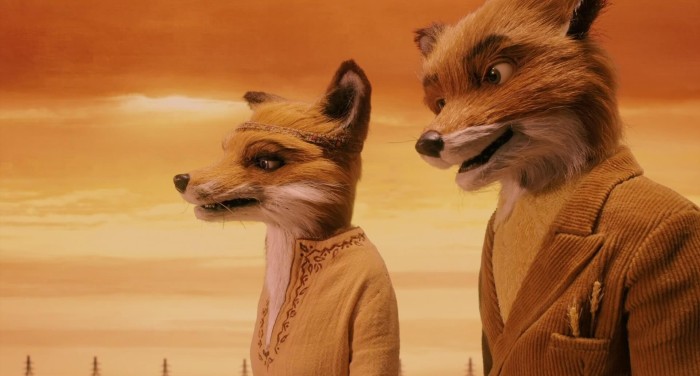
But a few minutes into the film, it’s plain to see that that, is not the case. Every character has their own flairs and perks, and there are so many details packed into every frame. The film is meticulously crafted, it looks *cough cough* fantastic, and the dialogue is as sharp as can be. If you’ve seen The Grand Budapest Hotel or Isle of Dogs, you know how great Wes Anderson is at making dialogue that might have you physically turning your head, and Fantastic Mr. Fox is no different. What I guess I’m trying to say is, the film drips with style. When you watch an Anderson film, you know its and Anderson film. And I feel like that might be lacking nowadays, in an age where movies are sticking tightly to formulas that have worked in the past all in an effort to maximise profits. This film is for the slightly crafty, somewhat curious individual, but it will probably surprise you if all you do is take it at face value.
Parasite
From the director of Snowpiercer, Bong Joon-ho, we get this masterpiece, a double entendre menace that like it’s predecessor sheds light on classism, societal struggles and modern anxiety. A drama that quickly devolves into a thriller with all the hints of a tragedy and a superbly acted film carrying all the momentum of multiple Oscars nominations. Parasite creates a stark contrast between the lucky and hardworking idyllic upper-class family, one with its own set of unique problems living in apparent bliss, with a family using everything it has to get through every day.
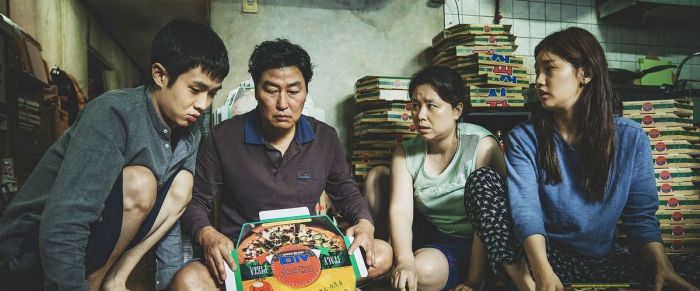
I think something that makes Parasite both riveting and excruciating to get through is the equal parts sympathy and revulsion. Our protagonists are using their wit, guile and will to survive. In order to even live, they have to make a plan so ludicrous that it plays out like a spy movie. But the lives of those that they’ve affected are irreparably changed and negatively affected, which makes us question ourselves. Do we support them, or not? Does doing everything to survive in an environment that is seemingly opposed to ur very existence so wrong? How far are we allowed to let class inequality go before it’s too much? Are some people fated to a life they had no part in choosing? Parasite makes us think about all of this and more while we watch it. And through the soundtrack, through the great shots, it was the writing that really made this movie stand out for me.
Akira
We often think of Sci-Fi as this tiny bubble consisting of Star Wars, maybe Star Trek and the occasional reboot, remake, or big budget release. Most people don’t have a huge grasp on hard sci-fi vs soft sci-fi either, and I can’t blame them. It’s an incredibly difficult thing to grasp, and there’s only a handful of sci-fi media responsible for bringing sci-fi to the fore. Akira, is one of those pieces of media. Directed by Katsuhiro Otomo and based on his 1982 Manga of the same name, Akira introduces us to the concept of Neo Tokyo. A concept that has been reimagined, parodied and of course referenced more times than you think. It led way to the popularity of anime in the west, the establishment of Japanese Cyberpunk as its own sub genre within sci-fi and I’ve seen its hold on everything from movies to hip-hop.
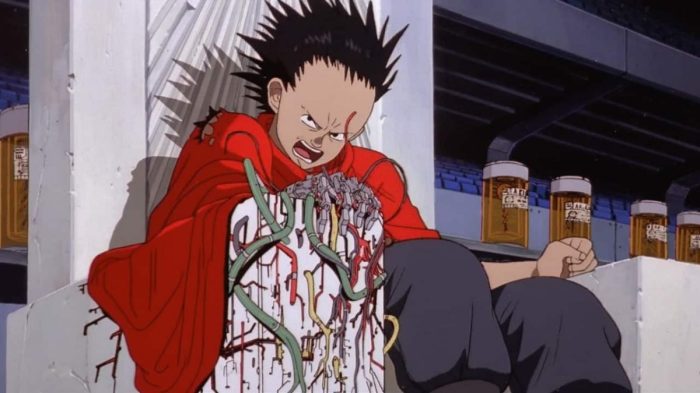
I think Akira is a work of art for two reasons. Firstly, it’s art style, music direction and animation. By the 80s, many people most likely still thought that all animation was for kids, whether in the West or East. Akira, with its dark symphonic soundtrack, unsettling characters and dark colour palette made it easy for adults to feel unsettled. Which all culminates in the climax that is Tetsuo’s transformation, a pitiful but nonetheless horrific show of bodily ruin. Just from a few stills, everyone can recognise Akira(although they often mistake Tetsuo for Akira much like Link for Zelda) and that’s thanks to the amazing art direction. A spiky haired Tetsuo, Kaneda holding that BFG or landscapes of Neo Tokyo. They’re all scenes that are both poignant incredibly breathtaking, and I doubt many people back then had seen anything like it.
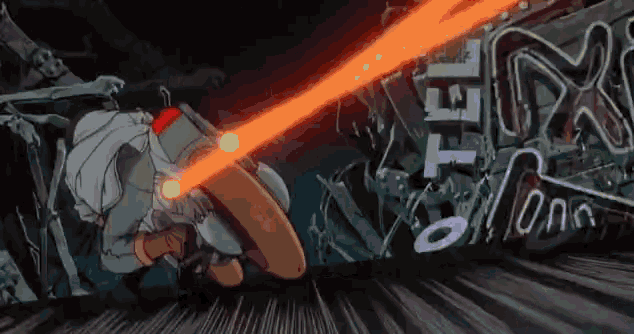
the second reason is, of course, the cultural impact the movie had on the rest of the world. It almost single-handedly started a revolution, inspiring influential creators from the East and West, something few works of fiction have achieved on such a large scale. It led way to a sweeping movement that resonates throughout pop culture. People were shown not only that animation could be highly profitable for both people in the East and West, but that adults could drive the industry in ways previously unthought of. That you didn’t need toy sales and merch to bring home profits. That if you made something good, something that would resonate with people, it would be relevant for decades to come. Akira is a film that you have to watch, if only once. Whether you get it or not, well, that’s up to you, but it’ll sure as hell burn a hole in your brain and might just leave you wondering what you’ve been missing out on this whole time.
Dunkirk
An interesting film to say the least, I was tempted to choose a more memorable, or rather, well-known war movie. Perhaps Apocalypse Now or Fullmetal Jacket, although those films could have whole articles written on them, as they already have. Instead, I chose Christopher Nolan’s Dunkirk because it plays on one strength in particular. Silence. Now, that’s not to say it doesn’t have any other redeeming qualities. in fact, it’s definitely in my top 5 greatest war films of all time(as of writing this), but let me discuss how the element of silence weaves its way throughout the rest of the other elements.

Rather than focussing on the Battle of Dunkirk, the film instead focusses on the Evacuation of Dunkirk, a truly heroic event which saw over 300,000 troops rescued in a little over a week(seriously, read about it). The heroes in the film are the unseen captains of the naval ships being assailed by Stuka dive bombers as they frantically try to get their people out of hell. It was the invisible nurses, doctors and field medics trying desperately to save as many men as they could, even though there was absolutely no guarantee the were getting back home. It was the brave RAF bombers flying over the Channel to fight back the seemingly endless. But more than anything, it was the cres of all those fishing vessels, risking battleships, submarines, fighters and bad weather all to save as many men as they could. And so in this lack of enemy engagement, in this quiet before the storm, the effects of silence kick in. The crunch of boots on gravel, the whistling of the bombs before they drop, heavy breathing of our panicked characters. It can all seem overwhelming when our senses aren’t constantly being assailed by the shouts of burly men as they fire off twin machine guns into a hoard of screaming enemies while explosions sound off in the distance. And all of this leads to the next parts.

Fear and Scope. First, let’s talk about scope. Dunkirk does its damnedest to make sure we don’t latch onto one character. In that sense, even though we don’t get to go on a long emotional journey, we get to see what war is really about. A series of interconnected stories and tragedies. Heroes and unwitting fools on both sides. From commanders to lowly foot soldiers, no one is immune to despair, defeat or even ill luck. Once the bullets start flying, it’s one big organised free-for-all. Operation Dynamo allows the viewer to understand just how massive an undertaking the whole thing was. Focussing on one person’s perspective wouldn’t have done justice to the hundreds of thousands that were stuck in Dunkirk, and it sure as hell wouldn’t have done it for all the many heroes and lost lads on that shore far from home. But in focussing on that scope, by incorporating that silence and removing the “central hero” figure, Dunkirk creates an element of fear. After removing all the elements that make up the modern war film and showing us just how terrifying one minute on the front lines can be with some bomb whistling, we feel scared. Some of the soldiers look far too young and pretty to be facing down bullets every day. War is indiscriminate, and after only a few minutes in, we see just how fast and easy it is to lose one’s life.
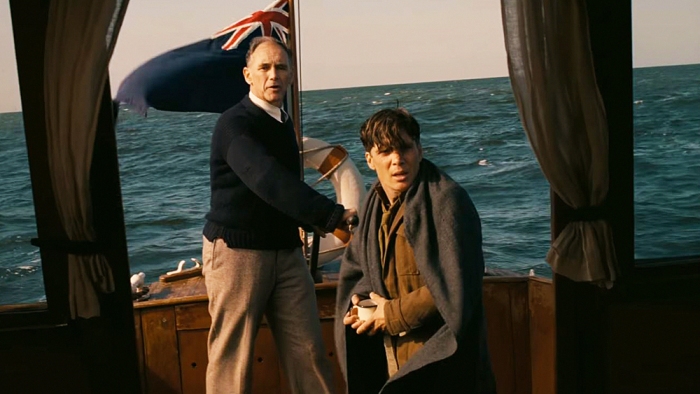
There’s no Rambo, and the cavalry isn’t going to bomb all the Germans out of the trenches and buildings. No, what the men were looking for was a miracle, one that shouldn’t have happened but did.
Rebel Without a Cause
I won’t say much about this one, mainly because I’m still getting a hang of watching and reviewing old flicks. After all, there was no CGI, and practical effects had a long way to go still. People talked different and held different views and opinions. For some people, it can be hard to see exactly why this movie stands the test of time. Well, it manages to capture something that almost everyone can relate to despite the differences in era. The Spirit of Rebellion. Like The Wild Ones, Rebel Without a Cause highlighted key issues within American Society, and the distress affecting so many teenagers at the time. The family unit as it had always been known was shifting and breaking down. Kids were getting way more freedom, ideas were being exchanged rapidly. So when the devilishly handsome(and talented) James Dean talks back to his parents not merely because he wants to but because he feels like there’s something so inexplicably wrong with everything, we relate to him. At that time, the family unit seemed to be breaking down, gangs were being formed and people seemed to be at a loss. And it was this nihilistic loss, this sort-of, disregard for the rules that was beginning to creep into American society. Gone were the hunky-dory days of old, it was now time to break shit.
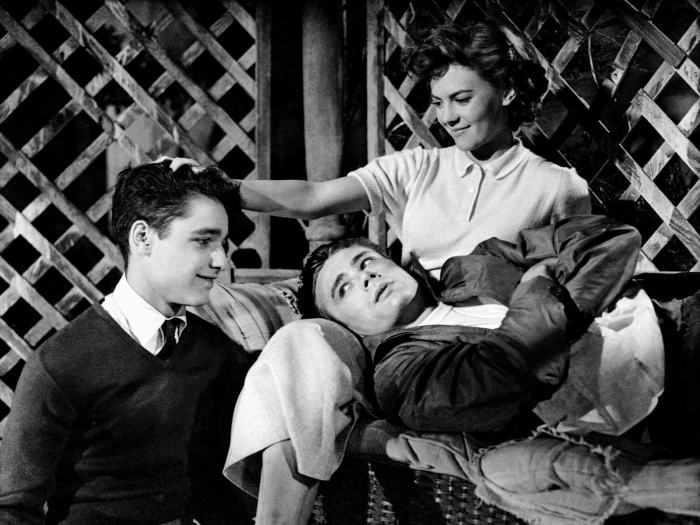
Interestingly enough, the movie, which by today’s standards is incredibly tame, was censored and outright banned in some countries. It was even given an X-Rating(rated R) in Britain and had to be smuggled into Spain. Perhaps, if anything, it was a highlight of teenage nihilism. A nihilism and outburst that would spread forth, expand and root itself in teenage subculture for ages to come. Perhaps that’s why so many adults were vehemently opposed to it. I still say that it was because they were utter prudes, unwilling to accept the changing times and people.
Honourable Mentions
The Godfather
Francis Ford Coppola’s seminal gangster film that set the Corleone family as an immortal staple of crime cinema, it’s a movie that almost everyone has heard of, if not watched. Needless to say, it’s only an honourable mention because I would need far more time to tackle this 3-hour behemoth, but if you’ve missed it, or are too scared to dig into it, well…do it you coward.
American Psycho
A movie that has been open to interpretation since the first wave of moviegoers saw it, it’s a bitter look into yuppie culture and the rat race that was the finals to upper-class elitism. Watch it if you don’t mind a smattering of gore and ultra-violence with your satirical horror.
Donnie Darko
This movie made me think. It was one of the first movies I decided to watch during this year’s one-film-a-day challenge, but it spurred me on for a good while. It’s also one of Jake Gyllenhaal’s best performances. I’d say go for it, and uh, don’t be scared of the bunny.
**If you like lists like this, let me know in the comments. If there’s anything specific you’d like me to write about, don’t hesitate to ask, and if there’s something you disagree with, I’m all ears. thanks for reading